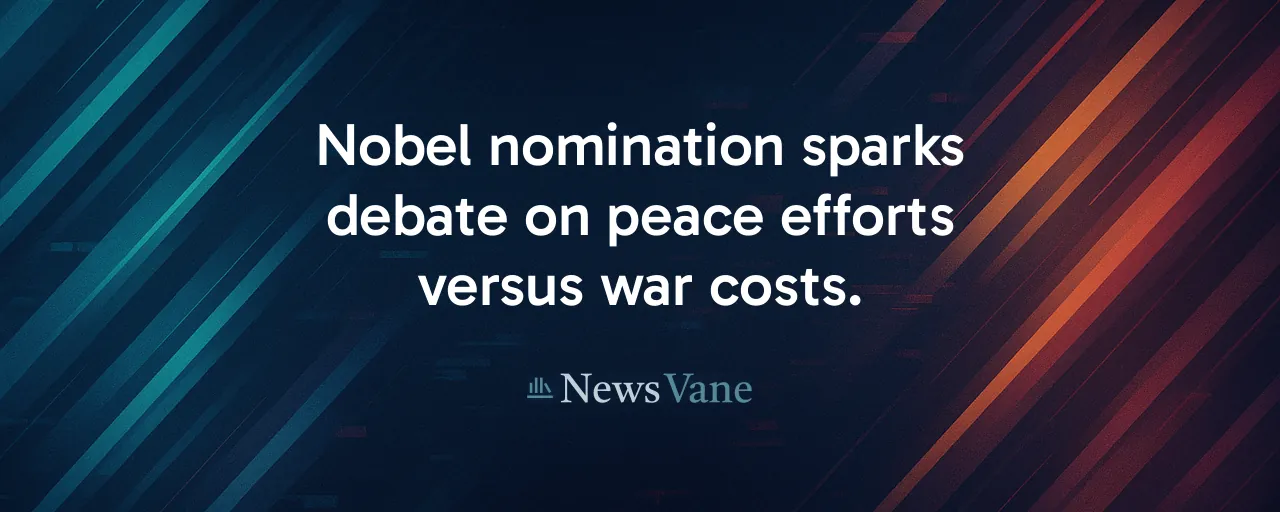A Bold Nomination Amid Conflict
At a White House dinner on July 7, 2025, Israeli Prime Minister Benjamin Netanyahu handed President Donald Trump a letter that stirred global headlines. The document formally nominated Trump for the Nobel Peace Prize, citing his role in the 2020 Abraham Accords, the recent Iran-Israel cease-fire, and ongoing Gaza truce talks. The announcement, made during a 21-month war in Gaza, arrived as a significant development in a region desperate for calm but scarred by violence. This announcement raises questions about the award's potential to catalyze lasting peace and its risk of becoming a fleeting political gesture.
The nomination arrives at a delicate moment. Gaza's conflict has claimed over 38,000 Palestinian lives since October 2023, with Israeli hostages still held captive. Diplomatic pressure for a permanent cease-fire mounts as humanitarian crises deepen. Trump, long vocal about wanting Nobel recognition, now faces a spotlight that could bolster his diplomatic legacy while also amplifying scrutiny of unresolved tensions. The Norwegian Nobel Committee, tasked with vetting nominees in secret, weighs these stakes against its century-old mission to honor tangible peace.
The Case for Recognition
Supporters of Trump's nomination point to concrete achievements. The Abraham Accords, signed in 2020, normalized ties between Israel and nations like the UAE, Bahrain, Morocco, and Sudan. These deals reshaped Middle Eastern alliances without new U.S. ground wars, a rarity in decades of regional policy. The June 2025 Iran-Israel cease-fire, brokered by the U.S., halted a 12-day missile exchange and curbed Iran's nuclear ambitions temporarily. Hostage releases in Gaza, linked to U.S. pressure, add to the tally of diplomatic wins.
Advocates argue these outcomes reflect bold, transactional diplomacy that sidestepped traditional gridlock. Congressional resolutions in the U.S. echo this sentiment, urging the Nobel Committee to recognize Trump's efforts. For Israel, the nomination underscores strong U.S. ties during wartime, boosting morale. The deals' long-term impact remains under scrutiny, with core Israeli-Palestinian issues lingering unresolved.
Shadows of Civilian Costs
Skeptics highlight a grim counterpoint. Gaza's war has devastated civilian infrastructure, with humanitarian agencies reporting widespread destruction. International human rights groups monitor potential war crimes by all parties, while the International Criminal Court investigates. Critics argue that honoring leaders tied to such conflicts risks diluting the Nobel's emphasis on fraternity and lasting peace. Palestinian voices, often sidelined in high-level talks, express frustration over their exclusion from agreements like the Abraham Accords.
The Iran-Israel cease-fire, while a step forward, lacks robust verification mechanisms, raising doubts about its staying power. Scholars note that Nobel awards typically follow definitive treaties, like the 1978 Camp David Accords, rather than interim truces. The nomination's timing, amid active conflict, fuels debate about its focus on political optics instead of measurable progress.
Lessons From Past Prizes
History offers context for the controversy. Past Nobel laureates like Henry Kissinger in 1973 and Barack Obama in 2009 faced criticism for receiving the prize amid ongoing military actions. Netanyahu himself was floated for a Nobel for the Abraham Accords but never advanced. The committee's preference for formal, durable agreements over mid-conflict efforts shapes its decisions. Hundreds of nominations flood the committee annually, with only a few reaching the shortlist after rigorous, confidential review.
Research on coercive diplomacy, like Trump's approach, shows mixed results. It can yield quick agreements, but lasting peace often requires inclusive negotiations. The Abraham Accords, for instance, shifted regional dynamics but bypassed Palestinian self-determination, a persistent flashpoint. The Nobel's reputational boost can sway domestic politics, as seen in Israel's morale lift, but its impact on actual conflict resolution remains uncertain.
Economic and Social Stakes
The nomination carries broader implications. U.S.-brokered arms sales tied to normalization deals exceed $50 billion, reshaping regional power balances. Gaza's reconstruction, estimated at $15-20 billion if a comprehensive cease-fire holds, depends on a lasting cease-fire. Sanctions relief for Iran could stabilize global oil prices but depends on diplomatic breakthroughs. These economic factors underscore the need for verifiable commitments to sustain any peace process.
Socially, the nomination deepens divides. In the U.S., it fuels partisan debates ahead of the 2026 midterms. In Israel, it lifts spirits but sidelines Palestinian grievances. Families of Gaza hostages seize the moment to demand full releases, amplifying their cause. The Nobel's symbolic weight thus risks amplifying tensions unless paired with inclusive steps toward resolution.
A Framework for Progress
Advancing peace requires pragmatic steps. Tying Nobel consideration to milestones, like a permanent Gaza cease-fire or verified Iranian nuclear rollback, could anchor the prize in tangible outcomes. Recognizing regional negotiators and humanitarian mediators alongside high-profile leaders would broaden the award's impact. An independent commission to monitor peace commitments before the December ceremony could ensure accountability.
Bipartisan U.S. legislation linking military aid to humanitarian law compliance and two-state talks offers another path. Such measures prioritize long-term stability over short-term symbolism. The Nobel's prestige could incentivize leaders to finalize Gaza truce talks before the October decision, but only if paired with inclusive, transparent processes.
Balancing Symbolism and Substance
Netanyahu's nomination of Trump thrusts the Nobel Peace Prize into a complex spotlight. It celebrates diplomatic breakthroughs while exposing the fragility of interim truces. The Abraham Accords and recent cease-fires mark progress, yet Gaza's toll and unresolved tensions demand scrutiny. The committee's decision will hinge on whether these efforts meet the prize's high bar for durable, inclusive peace.
For now, the nomination serves as a call to action. Leaders need to move beyond gestures to deliver verifiable commitments that address civilian suffering and regional stability. The prize's true value lies in inspiring solutions that endure, rather than merely who claims it.
As the world watches, the path forward rests on accountability and inclusion. Only through sustained, collaborative effort can the Middle East transform fleeting truces into lasting peace. The Nobel, if awarded, needs to reflect that reality, not just reward ambition.
